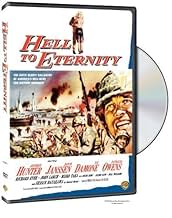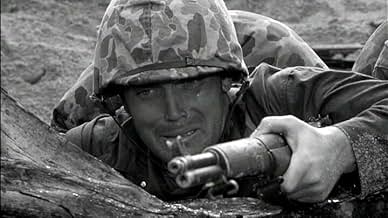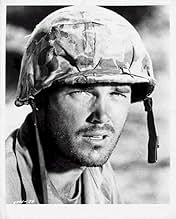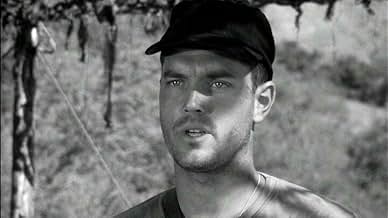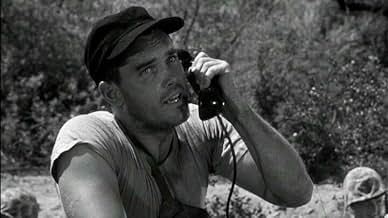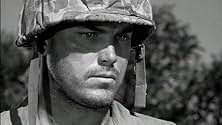NOTE IMDb
6,9/10
1,7 k
MA NOTE
Ajouter une intrigue dans votre langueWhen his adoptive Japanese-American family is sent to Manzanar after Pearl Harbor, a young Chicano enlists in the marines to become a hero in the Battle of Saipan.When his adoptive Japanese-American family is sent to Manzanar after Pearl Harbor, a young Chicano enlists in the marines to become a hero in the Battle of Saipan.When his adoptive Japanese-American family is sent to Manzanar after Pearl Harbor, a young Chicano enlists in the marines to become a hero in the Battle of Saipan.
- Réalisation
- Scénario
- Casting principal
- Récompenses
- 3 nominations au total
George Takei
- George Une
- (as George Takai)
Tsuru Aoki
- Mother Une
- (as Tsuru Aoki Hayakawa)
Avis à la une
Gabaldon was born and raised in Boyle Heights and attended Roosevelt High School with my brother-in-law Edwardo. He was not rejected by the Marines because of his ethnicity (Mexican-American) but because at 5'4" tall he did not meet Marine standards. It should be noted that the Marines were not adverse to recruiting in predominately Chicano communities. Guy was not "raised" by a Japanese family, but he did spend a couple of his teen year's with a Japanese family where he learned some basic Japanese. He was far from fluent in Japanese. However, the Marine Corps recruited him because they believed his knowledge of Japanese would be useful. The movie went to great lengths to hide Guy's true ethnicity. First, he was portrayed by Jeffrey Hunter, whose most notable role was playing 6'tall, blond blue eyed Jesus Christ. Guy described himself as "swarthy." In addition, there is a scene where the mamasan, in order to distinguish him from her Japanese grandchildren, refers to Guy as her "All American son." I once saw the movie on the History Channel. After the movie there was a panel discussion by historians. The final obligatory question was why the movie never mentioned that Guy was Mexican-American. The historian briefly answered that the movie was focused on the treatment of Japanese Americans during WW II and that Guy's ethnicity would have distracted from that. REALLY! Seems to me it would have made the story even more interesting. Typical Hollywood. Part of selling a movie means you have to make a white guy the central character and hero. More Hollywood is the David Jansen part and the party in Hawaii.
I have been trying to buy this movie but the prices are out of reach. I was on Okinawa in 1960 when this movie was filmed. Our battalion was the first to occupy the brand new barracks at Camp Schwabb. A lot of us marines were chosen to be in the Japanese army because of our looks or physical stature. yes I played the part of a Japanese soldier and during the bonsai attack I was killed. I must say I died very dramatically. I had the pleasure of meeting Jeffery Hunter, David Janssen, and Vic Damone. I think the movie was pretty good even though some important parts were omitted. I have read several articles on the life of Guy Gabaldon and he looked nothing like Jeffery Hunter. Have a nice day.
Hell to Eternity
This is the first movie (from Hollywood) to deal with the incarceration of Japanese Americans in 1942 during WWII. Eighteen years is a long time for someone to get a feature together about the problem but in 1960 most of the country didn't know about (or care about) the injustice of this mass sweep of American citizens of Japanese descent. You might say this movie is required viewing just to put that piece into perspective.
The big flaw of the movie is the simplistic way it presents the situation beginning in the 1930s. An honest, decent (indeed, admirable) Japanese family in California takes in a non-Japanese kid name Guy who comes from a bad home and needs a family. The point is clear: the Japanese family is amazing, generous, and rather typical of immigrant families where the older generation doesn't know English very well and the kids are all assimilated. As stiff as it is in some ways, it's truly touching and a warming, disturbing story.
Jump ahead to Pearl Harbor and you can see where the conflict is coming. Guy is now enlistment age (as are his Japanese foster brothers, who are fighting in the European theater). What follows is a war movie based somewhat on fact-the unit he eventually joins fights the Japanese, and there is doubt, heroism, and tragedy and it's a well done story. I wonder whether audiences in 1960 quite got into it, so long after the events. (Other WWII movies were still being made, but many are about the exceptional parts of the war, like D-DAy in "The Longest Day" in 1962 or Nazi trials "Judgement in Nuremberg" in 1961.)
The main character is supposed to be based on a Mexican-American kid, but the actor (Jeffrey Hunter) is a very white American, which adds to the contrast (and meld) between cultures. (Hunter's big fame? He was the captain in the very first Star Trek episode, before Shatner.) He makes a visit to what is supposed to be Manzanar (but they show painfully little of what it would have been like). And he ends up fighting the Japanese because he knows the language.
Exactly half of the movie is about the lead-up to fighting-lots of chummy interactions, girl chasing in military clubs, and kind of 1960s lightweight entertainment. David Janssen is one of Hunter's sidekicks, and he's really good (he was famous for being the TV star in "The Fugitive"). When the fighting starts the movie clicks into place -in fact, director Phil Karlson is great with smaller budgets and yet keeping an honest intensity to the acting. The fighting is very realistic (mixing in only a small amount of archival footage). And the final impressive crisis between Guy and the remaining Japanese troops is unique and compelling. And the movie builds to this point believably.
A great movie this is not-but it has great parts, which is more than many movies can offer.
This is the first movie (from Hollywood) to deal with the incarceration of Japanese Americans in 1942 during WWII. Eighteen years is a long time for someone to get a feature together about the problem but in 1960 most of the country didn't know about (or care about) the injustice of this mass sweep of American citizens of Japanese descent. You might say this movie is required viewing just to put that piece into perspective.
The big flaw of the movie is the simplistic way it presents the situation beginning in the 1930s. An honest, decent (indeed, admirable) Japanese family in California takes in a non-Japanese kid name Guy who comes from a bad home and needs a family. The point is clear: the Japanese family is amazing, generous, and rather typical of immigrant families where the older generation doesn't know English very well and the kids are all assimilated. As stiff as it is in some ways, it's truly touching and a warming, disturbing story.
Jump ahead to Pearl Harbor and you can see where the conflict is coming. Guy is now enlistment age (as are his Japanese foster brothers, who are fighting in the European theater). What follows is a war movie based somewhat on fact-the unit he eventually joins fights the Japanese, and there is doubt, heroism, and tragedy and it's a well done story. I wonder whether audiences in 1960 quite got into it, so long after the events. (Other WWII movies were still being made, but many are about the exceptional parts of the war, like D-DAy in "The Longest Day" in 1962 or Nazi trials "Judgement in Nuremberg" in 1961.)
The main character is supposed to be based on a Mexican-American kid, but the actor (Jeffrey Hunter) is a very white American, which adds to the contrast (and meld) between cultures. (Hunter's big fame? He was the captain in the very first Star Trek episode, before Shatner.) He makes a visit to what is supposed to be Manzanar (but they show painfully little of what it would have been like). And he ends up fighting the Japanese because he knows the language.
Exactly half of the movie is about the lead-up to fighting-lots of chummy interactions, girl chasing in military clubs, and kind of 1960s lightweight entertainment. David Janssen is one of Hunter's sidekicks, and he's really good (he was famous for being the TV star in "The Fugitive"). When the fighting starts the movie clicks into place -in fact, director Phil Karlson is great with smaller budgets and yet keeping an honest intensity to the acting. The fighting is very realistic (mixing in only a small amount of archival footage). And the final impressive crisis between Guy and the remaining Japanese troops is unique and compelling. And the movie builds to this point believably.
A great movie this is not-but it has great parts, which is more than many movies can offer.
When the United States of America went to war with Imperial Japan, many a Japanese national joined the armed forces and served the U.S. with distinction and honor. Among those who stood out was this story of a young Chicano from Los Angeles. Good looking Jeffrey Hunter, plays Guy Gabaldon who was raised by a Japanese foster family. Despite the discredit of government officials who interned Japanese/American citizens at the beginning of World War II, the people endured their imprisonment with dignity and patience. Gabaldon, turned down by his own draft board, nevertheless, joins the Marines and meets two close friends, played by David Janssen and Vic Damone. The three make this story touching and believable and their combat experience creates a worthwhile saga. The movie centers on the volatile hard fought conflict on the island of Saipan, where a determined enemy refuses to surrender. Interestingly enough, Guy Gabaldon risks life and limb, saving the lives of thousands of America soldiers and Japanese civilians, yet fails to be nominated for the Medal of Honor. A great and Noble film which has since become a war-time Classic. ****
This is a war bio-pic about Guy Gabaldon of the USMC . It's a strange film featuring two distinct halves . One of Gabaldon newly arrived in the Marine Corps and the second half concentrating on the battle of Saipan . When I say strange what I mean is that it's heavily clichéd but for someone reason it manages to hide the clichés very well
The first half features those loud American who constantly feature in these type of movies . They're drinkers , gamblers , womanisers and heaven help anyone who has no concept of the alpha male . What makes this part of the film interesting is that there's a nightclub scene that has rampant sexuality featuring a female character and Gabaldon played by Jeffrey Hunter which must have seemed somewhat explicit at the time
The second half features the bloody battle of Saipan and one interesting thing about the landings is that Japanese characters speak to Japanese characters in Japanese without the benefit of subtitles . Compare this to films at the time had Germans speaking to one another in English and characters speaking in their native tongue must have appeared unusual back in the day . The battle scenes are relatively graphic though little children turning reminded me of THE GREEN BERETS
The problem with this movie is that for something that is marketed as a war film it takes a long time to reach its destination of the battlefield and with the exception of the nightclub scene the film is very talkative with little in the way of incident which stops it from becoming a great film . As it stands it's okay though it helps if you watch it of the era of when it was made
The first half features those loud American who constantly feature in these type of movies . They're drinkers , gamblers , womanisers and heaven help anyone who has no concept of the alpha male . What makes this part of the film interesting is that there's a nightclub scene that has rampant sexuality featuring a female character and Gabaldon played by Jeffrey Hunter which must have seemed somewhat explicit at the time
The second half features the bloody battle of Saipan and one interesting thing about the landings is that Japanese characters speak to Japanese characters in Japanese without the benefit of subtitles . Compare this to films at the time had Germans speaking to one another in English and characters speaking in their native tongue must have appeared unusual back in the day . The battle scenes are relatively graphic though little children turning reminded me of THE GREEN BERETS
The problem with this movie is that for something that is marketed as a war film it takes a long time to reach its destination of the battlefield and with the exception of the nightclub scene the film is very talkative with little in the way of incident which stops it from becoming a great film . As it stands it's okay though it helps if you watch it of the era of when it was made
Le saviez-vous
- AnecdotesOn July 8, 1944, Pfc. Guy Gabaldon single-handedly brought in 800 Japanese prisoners. He is credited with a total of 1,500 from June to August, 1944 from Saipan and Tinian islands.
- GaffesIn all of Vic Damone's scenes as Cpl. Pete Lewis, he is seen wearing a very shiny gold bracelet, including in combat scenes. In reality, no person in combat would have been allowed to wear a shiny gold bracelet, nor would they have wanted to, out of concern for the bright glint given off which might betray their position. Damone should have been told to remove the bracelet during filming.
- Citations
Capt. Schwabe: Lewis? How's it going? Says here you were shot in the ashcan.
Pete: Not bad, sir. Could have been a howitzer.
Meilleurs choix
Connectez-vous pour évaluer et suivre la liste de favoris afin de recevoir des recommandations personnalisées
- How long is Hell to Eternity?Alimenté par Alexa
Détails
Box-office
- Budget
- 800 000 $US (estimé)
- Durée2 heures 11 minutes
- Couleur
- Rapport de forme
- 1.85 : 1
Contribuer à cette page
Suggérer une modification ou ajouter du contenu manquant



